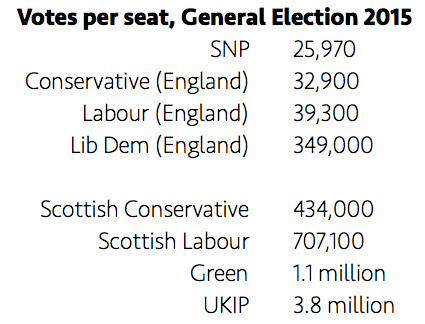Firm, but unfair – that’s the motto of Westminster’s first-past-the-post voting system and Conservatives will today be raising a glass to it. But the House of Commons is now a very poor reflection of Britain’s political sympathies. It took just 25,970 voters to return an SNP politican to parliament. This compares 34,240 for a Tory and 40,280 for Labour. In the circumstances, the Tories needn’t moan so much about the boundaries: the system paid out for them pretty well.
But the other parties? For a Scottish Conservative, the vote-to-seat ratio is an almighty 434,000 to 1. And if you think that’s bad, consider Scottish Labour: 707,147 voters are now represented by one lonely MP.
And if you think that’s bad, consider the Greens: 1.1 million of us voted Green on Thursday and they’re represented by Caroline Lucas.
And if you think that’s bad, Ukip has just set the record of the biggest vote-to-seat ratio in British history: 3.8 million votes. One in every seven votes cast in England went to Ukip, and these millions of voters have only one voice in parliament: Douglas Carswell.
The Tories have won a majority, and I’m personally delighted about that. But make no mistake: when the House of Commons returns, its composition will never have born less resemblance to the political will of the British people. As the third-largest party, the SNP will is technically entitled to all manner of places on select committees – even chairmanships – presiding over English matters. They get to call two questions in PMQs. Yet this clout will completely fail to recognise the presence of Scottish unionists (half of Scotland’s population is now represented by just three MPs) or the 1-in-7 English voters who chose Ukip.
So when influence in the new Commons is divided up, it should be done so with consideration of votes cast – not seats won. Seldom has there been a worse relationship between the two.







Comments